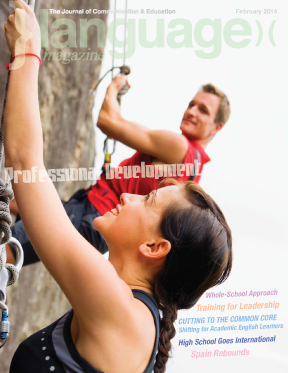Sharing Skills
Language education has never really been afforded the status it merits in U.S. public schools. Despite the rhetoric of No Child Left Behind and “closing the achievement gap,” English as Second Language (ESL) teachers are always being shortchanged in terms of resources and pay, while world language educators face repeated funding cuts since their subject is rarely considered part of the core curriculum. However, it now transpires that the skills and experience of these teachers are vital to the success of schools across all disciplines.
As Margarita Calderón explains in this month’s issue (page 18), U.S. demographics, insufficient funding, and the demands of recent legislation, particularly the Common Core State Standards, have made it imperative for all teachers to take part in the language acquisition process of English learners. Teachers of all subjects are being required to help educate ESL students in mainstream classrooms. While this may seem a sensible move in theory, the reality is that the vast majority of teachers have had very little training in ESL methods and few school districts are making provisions to train them for this task. Although it may not be the ideal solution, a practical improvement would be for ESL specialists to coach their colleagues to perform this function as well as possible. Not only will this assist teachers of other subjects and English learners, it will also firmly establish the importance of specialist ESL educators across the curriculum.
The other area in which language educators are set to play a key role in the professional development of their colleagues is in the implementation of educational technology. As school districts across the nation race to supply their students with the latest iPads and other tablets, language educators are ideally placed to lead their peers in the integration of technology, thanks to decades of experience.
Language teachers have been avid users of technology for a very long time. From the 1950s, when vinyl records and foreign radio broadcasts were used, through the ubiquitous language labs of the 1970s, to the latest interactive, computer-assisted language learning programs, language teachers have been at the forefront of the application of classroom technology. They know what works and what doesn’t; they know how best to overcome technical glitches; they know how best to introduce new programs and devices; and they know when the teacher needs to intervene.
In the mad scramble to digitize our classrooms, the experience of language teachers is invaluable. Sharing this knowledge with administrators and colleagues will save time and money, and help to minimize the frustration of students and staff as they grapple with this new learning equation.
By recognizing the interdisciplinary value of their expertise and sharing their knowledge, language educators can start to achieve the recognition they deserve.
IN THIS ISSUE:
Teaching Across the Board
Margarita Calderón explains why developing a whole-school approach to English learners’ academic achievement is key to Common Core implementation
Learning by Extension
Jonathan Harper explains how to build a community-based teacher-training program online
Venerable Vulnerability
Loic Bourdeau on the Modern Language Association’s 129th annual convention
Fighting for Freedom
Natasha E. Feghali believes that student autonomy requires strong leadership
Cutting to the Common Core: Changing the Playing Field
In the first installment of a two-part article, Jeff Zwiers, Susan O’Hara, and Robert Pritchard present essential shifts for teaching Common Core Standards to academic English learners
Advantages of U.S. Prep School Homestay
Staying with a family is a popular option
Global Grade School
Not only do the increasing number of international students attending secondary schools benefit from the experience, so do their local peers
Celebrate Spain’s Cultural Diversity
There’s never been a better time to take that much-anticipated study trip to Spain
Last Writes Richard Lederer says ‘Happy Valentine’s Day’



